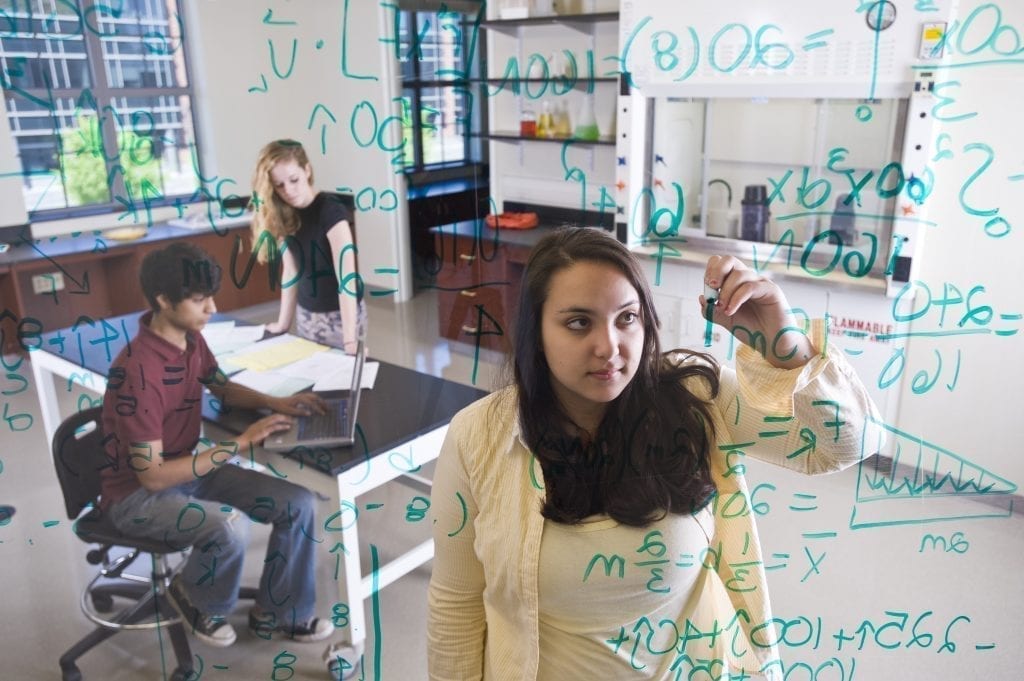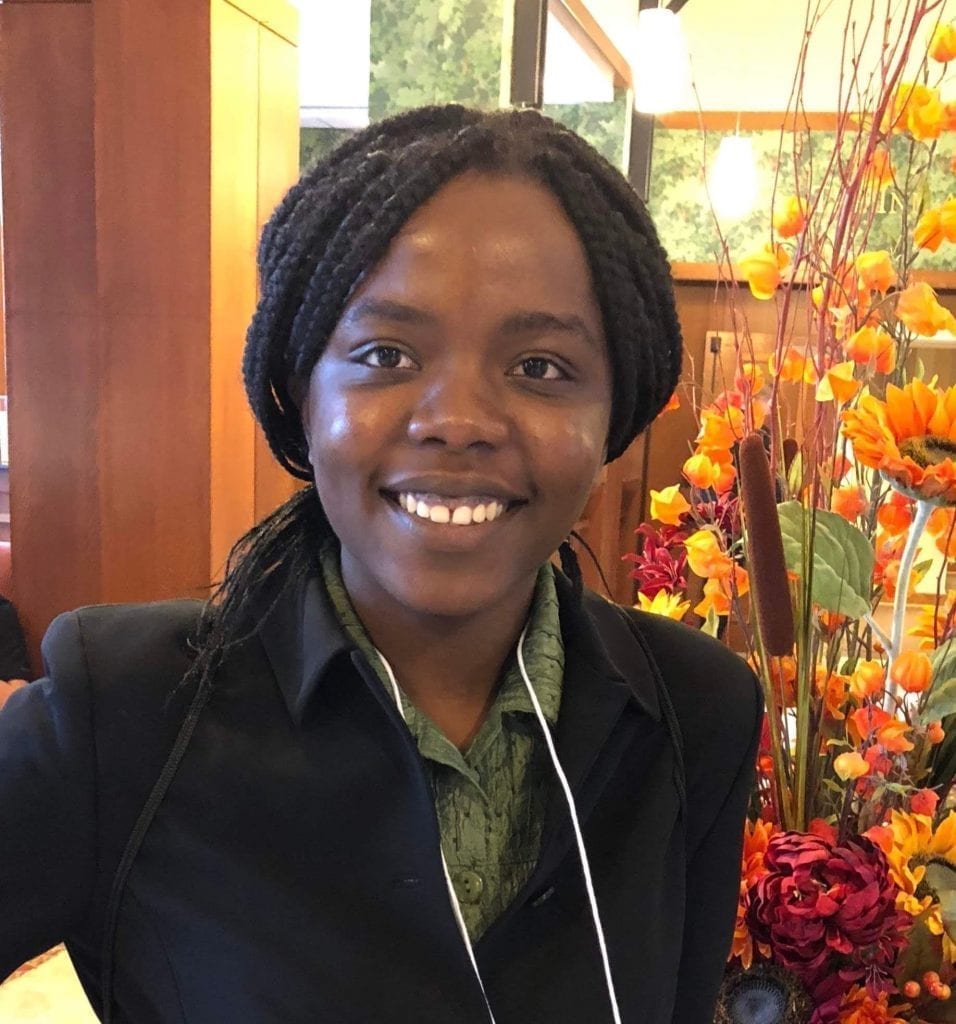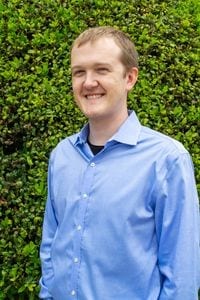REAL-world experience
Student-centered initiative seeks to measure and improve invaluable hands-on learning

By Sarah Lockwood
When Nana Afia Twumasi-Ankrah took a Phage Discovery lab course in the spring of 2018, she knew what she wanted to major in at Virginia Commonwealth University: bioinformatics. But it wasn’t until her first internship that summer, using skills she had learned in an actual lab, that she understood what working in the field really meant.
The value of this kind of real-world experience is why VCU President Michael Rao, Ph.D., is committed to ensuring that every student has an experiential learning opportunity at VCU.
“It’s part of our culture, it’s part of the marrow of the institution,” says Erin Webster Garrett, Ph.D. (M.A.’92/H&S), assistant vice provost of the Relevant, Experiential and Applied Learning initiative, better known as REAL, tasked with making this promise a reality.
Webster Garrett is proud that her alma mater has undertaken this effort to identify the areas — and there are many — where experiential learning is already happening, learn from them and create a plan to fill in the gaps.
In 2018, she assembled a taskforce of 19 faculty, staff and students to develop a methodology for an “opportunity audit,” creating a process to assess the current prevalence, depth and kind of experiential learning already occurring in classrooms.
The team looked for four key components. First, they created a classification system to identify classes with hands-on learning. Next, they wanted to know which of those were embedded with guided reflection, a process of critically examining and discussing an experience that research shows strengthens students’ abilities to apply lessons learned in the future. Third, the team pinpointed integrative learning as the goal — a student’s preparedness to transfer knowledge between experiences, translate their actions into goal setting and learn from what they’ve done. An additional element the audit searched for is mentoring.
“Mentoring is often identified as one of the big six college experiences that is tied to life preparedness,” Webster Garrett says. “We know that it has a big impact not only on a student’s career trajectory, but also on their overall well-being.”
Meaningful opportunities
For rising senior Nana Afia Twumasi-Ankrah, mentorship has led to abundant opportunities.

She discovered her first opportunity as an intern in a lab at the University of Virginia through the National Science Foundation’s Louis Stokes Alliances for Minority Participation.
It was there that she met her first mentor who told her she would be in charge of developing a bioinformatics toolkit into the lab, even though she had no previous experience.
“I had no idea what I was doing,” Twumasi-Ankrah says, but that summer, she learned what discovered what it meant to be a bioinformatician and the value of answering biological questions through computational resources. Much of the work she completed that summer entailed reviewing bioinformatics software and providing recommendations on what tools would be useful for analyzing the DNA sequences of different strains of the bacteria that causes gonorrhea. Learning through doing was just what she needed.
“Looking back, it was very tedious work, but I think that it was the best introduction to bioinformatics that I could have had,” Twumasi-Ankrah says. “It wasn’t glamorous, but I was able to learn a lot on my own, just [by] exploring and asking questions.”
Twumasi-Ankrah learned independence in this first internship. As a sophomore, she participated in the National Institutes of Health’s Initiative for Maximizing Student Development at VCU. Program Director Sarah Golding, Ph.D., a biology professor, learned of Twumasi-Ankrah’s interest in women’s health and introduced her to Jennifer Fettweis, Ph.D. (Ph.D.’09/M). Fettweis, her current mentor, invited Twumasi-Ankrah to join her lab, where she’s been working for nearly two years. The team researches the vaginal microbiome.
“I think having that early experience gave me an advantage when approaching classes,” Twumasi-Ankrah says. She frequently applies recently acquired knowledge from coursework to the independent research project she’s been working on in Fettweis’ lab.
Twumasi-Ankrah, who was named a Goldwater Scholar in April 2020, thinks that experiential learning and the mentors who have guided her research have transformed her career trajectory. She’s looking forward to continuing her research and is interested in pursuing a Ph.D. in computational biology.
“Shout out to all the mentors who have guided me,” Twumasi-Ankrah says. “Since my very first day at VCU, I’ve been blessed by having different people who have offered their advice and have been just really supportive.”
Closing the gap
Experiential learning opportunities aren’t always financially viable, however.
“Through REAL we are looking closely at student participation data and strategically raising the bar so that we can fulfill our promise that every student will receive an equitable, high-quality experience,” Webster Garrett says.
That means increasing student awareness of opportunities while reducing barriers to their participation. As an example, REAL’s audit process created a space for faculty and staff leaders to look at the financial choices many students had to make. In some cases, students were choosing not to register for internship courses because of the financial double-whammy of paying tuition to take an often-unpaid internship. In consequence, the significance of their internships was often invisible to advisers, faculty and prospective employers looking at academic transcripts, and the internships occurred without the structured support and coaching that can turn an average experience into a transformative one. In response, some departments are now exploring the use of zero-credit courses that would give interns a way to officially document their internships and have an institutional framework and support without incurring additional financial burden.
Bestselling novelist and VCU alumnus David Baldacci (B.A.’83/H&S; H.L.D.01) and his wife, Michelle, also are helping close the opportunity gap. In 2017, they established the Baldacci Student Experiential Learning Fund with a $1.1 million gift, providing grants of $1,000 to $5,000 to academically promising students from diverse backgrounds and areas of study to pursue internships, attend conferences, conduct research, study abroad and more.
With his grant from the fund, Jeremiah Meadows (B.A.’20/H&S) studied abroad in South Korea in the summer of 2018. Meadows, who transferred from community college at 27, says he would not have had the money to study abroad if it weren’t for the Baldacci fund.

Meadows, a member of the VCU Honors College, double majored in political science and philosophy. While his study abroad trip was not focused on his academic interests in civil and human rights, he says that the opportunity to get to know another culture was invaluable and essential to his career goals. His dream is to be a human rights officer at the United Nations, a position for which international experience is essential.
This trip, where Meadows studied Korean language and Korean cultural experiences, was the first time outside of the U.S. for Meadows, who grew up in a small town near Harrisonburg, Virginia. “Admittedly, I had a bit of a struggle when I first showed up there. It pulled me out of my comfort zone, but I got to experience [a new culture] firsthand.”
Meadows is excited to attend William & Mary Law School this fall.
“My driving purpose is to do as much good as possible with as few resources as possible,” he says.
Real-world readiness
Through collaboration with academic programs and key partners such as VCU Career Services, the Office of Undergraduate Research, the Center for Community Engagement and Impact, the Global Education Office and the Division of Student Affairs, REAL is carrying forward VCU’s commitment to creating change agents and preparing students for their next steps.
Oceanna Samarripa, a first-generation college student on track to graduate in August 2020, has spent her academic career scheduling her time down to the hour. Sometimes working as many as three jobs and commuting from Fredericksburg, Virginia, she has deliberately supplemented her classwork with jobs that involved experiential learning to contribute to her career readiness.

One such position was with Henrico County Sheriff’s Office. In 2018, Samarripa attended the Henrico Summer Basic Jailor Academy, an eight-week internship.
After the academy, she worked in the sheriff’s office part time as a deputy to help pay her way through school. Samarripa says that nearly all of her co-workers at the jail were at least 10 years older than her, and the experience taught her to be receptive to criticism.
“I was closed-off and Miss Know-it-All, but I had to learn,” she says, adding that learning to talk to people arrested for or charged with a crime was illuminating.
“It showed me lives that I never ever thought I’d be subjected to or learn about,” Samarripa says. “I hate seeing [prior offenders] come back. That’s why I want to be on the front lines.”
She now works in Henrico courts as a bailiff and is applying to police academies. While she hopes to work as a deputy police officer first, she eventually wants to be a lawyer, a calling she discovered while interning for attorney Ericka Battle (B.A.’10/H&S) with Richmond law firm Coates & Davenport PC in the summer of 2019.
On top of these various internships and part-time jobs, Samarripa also worked at VCU Career Services throughout her academic career, encouraging students to take advantage of opportunities.
In her capacity as a senior career ambassador training new students to do the same, she was like a walking advertisement for the REAL initiative: “VCU has so much to offer whether it’s service learning, volunteer, Globe and work-study.
“I tell them, ‘You grow from all types of experiences, no matter what it is.’”
Categories Alumni, Students